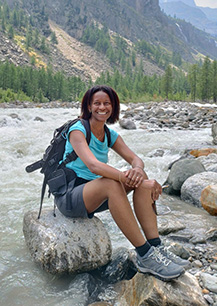
Dr Flavia H. Santos is a neuroscientist and is Assistant Professor and Ad Astra Fellow at University College Dublin, Ireland. She is also a member of the Irish Children's Research Network and Director of UCD Music and Math Cognition Lab. Her research focuses on mechanisms of numerical cognition and aims to improve maths learning through interventions for maths anxiety and developmental dyscalculia. She leads the Arithmós Project funded by the Irish Research Council, which aims to transform children’s maths education through the engagement of children, teachers, families, and policymakers. Dr Santos advocates for women in STEM.
1. What’s your earliest memory of doing mathematics?
I have a vivid memory of the day I realised reading. I can still hear the voice of my teacher while showing cards with syllables on the board, saying that we could bring them together to form words. I easily grasped it as a pattern, a list of codes, a combination of sounds. Well, I do not remember doing maths before this period. But I do remember my father using mental calculations in all contexts! That was a great influence on me! On my first visit to the US, I bought my father a postcard from the Golden Gate Bridge in San Francisco. After a few instants of looking at the photo, he told me the width of the bridge with striking accuracy. I asked, “How do you know that?” He said, “Based on the size of a car portrayed in the image, I could estimate how many cars could be aligned on the bridge.” My father is 91 years old and is still sorting arithmetic without calculators!
2. How has mathematics education changed in the time you have been involved in it?
Well, I believe maths education and other fields of education are constantly changing. Current students were born in the digital era, while some parents and teachers were not. Teachers and parents were educated through different methods from what is now expected in the classroom and homework. Memorisation and repetition were turned into minor ways to teach maths. There are games, apps, and other resources to support learning. Maths education no longer relies solely upon the teacher in the classroom environment. The pandemic changed the way we look at education and convey content. Online teaching and recorded teaching allow paced and inclusive resources and raise occasions to learn. However, technology is not available to all. In developing countries only a few schools and pupils will have access to gadgets, the digital literacy to use them, access to the internet and updated or licensed software. Another challenge is to measure what are the successful resources and tools available; that is, their efficacy to improve learning.
3. Tell me about a time in your career when something totally flabbergasted you.
In the fourth grade, I got my first ever partial low grade, and it was in maths (4.0 out of 10 points)! I arrived home upset and got a very supportive attitude from my parents. They quickly found a person to give me private maths classes. This private teacher handed me some oral problems to sort out. Well, she noticed that I was getting the right responses, but that I was using different logical reasoning to reach them. That was a discovery which entirely changed my relationship with maths: Yes, you can sort maths problems properly in new ways from the textbook or teachers’ examples! So, I developed confidence and never needed additional support after that.
4. Do you practise mathematics differently in company?
I think it really depends on who is doing maths with you. If you are practising with peers, there will be lots of sharing, nurturing, and helping each other. But if you are in front of your teacher that could be intimidating! Running intervention studies to support maths learning, I notice that when children are working in the presence of a tutor, they are more engaged. Even if each child is on their own tablet, in the presence of other students working on their exercises, children seem more inclined to practise. Also, when we provide students with the opportunity to work in small groups, the experience is more pleasant and fulfils their sense of belonging.
5. Do you think a brilliant maths teacher is born or made?
Well, we all have basic capacities to share maths knowledge with others and should not waste and miss opportunities to do so. However, I think brilliant maths teachers are made. The main ingredient is a passion for maths: the person must dedicate time to learning the subject in-depth. People who love what they're doing will do it better because they will spend more time preparing it, organising it, and exploring different ways to explain the content to students. Another well-known factor is that years of experience play a role in the quality of their teaching, as will the resources available in their schools, their workloads and salaries. Nowadays, there are techniques and specialised training available allowing teachers to develop great didactic skills. One more ingredient: Enjoy inspiring curious minds! So even the most talented teacher needs practising and the right conditions to become a brilliant maths teacher.
6. What’s the most fun a mathematician can have?
Well, I’m not a mathematician. I suppose mathematicians will have delightful moments sorting complex mathematical problems. But also, teaching others to progress in their understanding of maths. You could add working without anxiety about teaching maths!
7. Do you have a favourite maths joke?
I'm the kind of person who hears a joke, laughs a lot, and forgets it. I like cute maths jokes, the ones you can share with children, like Why is the circle sad? Because the triangle shouted: “You’re pointless!” Maths teachers can use jokes, cartoons, etc., to spark a cool classroom ambience and to improve children’s classroom engagement.
Join the conversation: You can tweet us @CambridgeMaths or comment below.